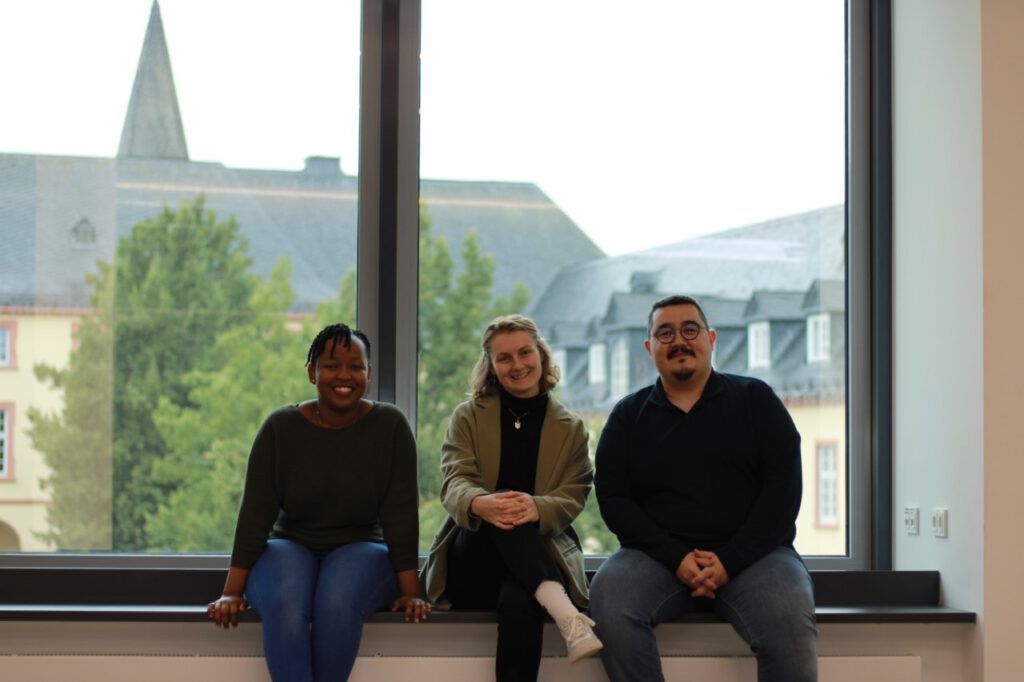
Master
Economic policy
Short information
| Restricted admission | Prescribed period of study | start |
| no | 4 semester | winter semester |
Restricted admission
Application required
Application deadline
01 April to 15 September Application possible for the winter semester
01.01.- 30.04. only for non-EU-foreign applicants
Study Program
The Master in Economic Policy Siegen (MEPS) program is designed to prepare students for the challenges that an increasingly globalizing economy imposes on businesses, economic policy, and society. Therefore, students receive profound training in economic theory and econometric techniques and are enabled to independently analyze questions of practical and political relevance empirically. The master’s program has a strong international focus and is therefore taught entirely in English. The program starts every winter semester.
The MEPS program consists of a small share of compulsory courses amounting to 30 credit points, which are concerned with the acquisition of fundamental economic theories and techniques. Apart from the master’s thesis (15 credits), there is a vast offer of elective courses to gain the remaining 75 credit points. Thus, MEPS students have the opportunity to design their study program in a way that suits their interests and goals.

5 reasons to study economics in Siegen
✓ small groups with integration into an active (international) economic community
✓ close supervision relationship with lecturers and tutors
✓ wide range of different electives on offer
✓ excellent connections to European institutions (European Central Bank, European Commission, etc.)
✓ comparably low cost of living
Career prospects
The Master’s degree in Economic Policy opens up a variety of individual career paths. In addition to positions in companies in almost all sectors of the economy, government institutions at local, regional, national, and European levels, finance and banking (e.g., European Central Bank, Bundesbank, private banks, international organizations (e.g., OECD, WTO, UNICEF, IMF), and political consulting offer interesting career opportunities for our economists.

MEPS Students (Liliia Klachko, Lilian Malamsha, Yasin Tosun) say:
“An intellectually stimulating curriculum, a vibrant international community, and unparalleled career opportunities!”
Continue reading
Curious about how international trade shapes global economies? Wondering how financial crises can be prevented? Eager to understand the economic implications of climate change? The International Master’s in Economic Policy (MEPS) at the University of Siegen covers these pressing questions and much more. Our program delves into the heart of contemporary economic challenges, providing a thorough grounding in both theoretical and applied economics. With general but also focused courses in every modern and up-to-date field of economics, the MEPS program ensures that every student finds their niche.
A global learning experience
At the University of Siegen, the diversity of the student body creates a dynamic and enriching learning environment. Students from around the world come together, bringing a wealth of perspectives that enhance classroom discussions and collaborative projects. The university’s close proximity to major German cities such as Bonn, Cologne, Düsseldorf, and Frankfurt opens up a wealth of opportunities for cultural experiences, internships, and networking events.
Exceptional Faculty and Comprehensive Curriculum
Our professors are leading experts in their fields, bringing cutting-edge research and real-world experience into the classroom. They are dedicated to fostering an engaging and supportive academic environment, encouraging students to push boundaries and develop critical thinking skills. The comprehensive curriculum is designed to equip students with advanced knowledge and analytical tools, preparing them for successful careers in the private sector, international organizations, and academia.
Social Life and Networking
Life in Siegen is not just about academics. The university’s vibrant student community ensures a balanced and enjoyable experience. From international nights and cultural festivals to hiking trips in the picturesque Siegerland region and social events like pub crawls and BBQs, there are countless ways to relax and build lifelong friendships. The university also organizes excursions to significant economic institutions, such as the European Central Bank, offering practical insights into the world of economic policy.
Support and Facilities
The Academic Advisors of the Economics Department are always available to support students with their academic and personal needs. The Lower Castle Campus, with its blend of modern facilities and historical charm, provides an inspiring setting for both study and relaxation. Our very modern and rich library, brand new well-equipped rooms for classes, and a very nice and cozy student restaurant right next to our campus in the center of the city enhance the overall learning experience.
We, as MEPS students, wholeheartedly recommend this program to anyone passionate about economics. The knowledge, skills, and experiences gained here are invaluable, and the friendships and memories made are unforgettable. Choosing the International Master’s in Economic Policy at the University of Siegen is a decision we would make again without hesitation!
Admission requirements
1) To apply for the MEPS program you need to have an appropriate bachelor’s degree with at least six semesters regular period of study.
2) An explicit academic background in economics is an advantage but not necessarily required. Should you have no explict or only a weak economic background we would like to ask you to especially document that your formal (mathematical and statistical) background is sufficient to enable you to meet the formal requirements of our quantitatively oriented master’s program.
3) The final average grade of the undergraduate degree should be 2.5 or better according to the German grading scheme. The conversion of grades is done by means of the Modified Bavarian Formula.
4) If English is not your first language or if your bachelor degree has not been achieved in a program taught entirely in English, additionally a sufficient knowledge of the English language (level B2 CEF – Common European Framework) has to be documented. English language qualifications comparable to a ‘B2 level’ can be documented as follows:
- TOEFL test results of at least 550 (paper-based), or 213 (computer-based test) or 79 (internet-based test)
- IELTS test with a minimum score of 6.5 points
- Cambridge/Oxford Certificate: PET
- English language qualifications obtained through at least five years of English instruction in secondary/high school. You are required to enclose copies of your upper secondary/high school certificates, including course and examination descriptions of your English language course for these five years.
The current examination regulations are valid.
Study organization
Examination regulations/degree plan/module manuals/internship rules
Examination regulations (POs) specify the basic structures of a degree program (e.g. admission requirements and contents to be studied). Students are automatically subject to the current version of their PO when they matriculate for their first subject-related semester. This means that even if the PO changes during their studies, the original version according to which they matriculated will remain valid (provided that the PO does not expire).
The respective degree plan is the recommended example progress of the studies in individual subjects and is part of a PO.
Supplementary provisions and details for any module to be studied can be found in the module manually (e.g. requirements for taking a written test or content-related information on the modules/events, ...).
The Internship Rules define the conditions under which the required or optional internships must be completed.
We recommend at least looking at the study schedule for your degree program before the lecture time starts, to ensure that you know which modules are intended for the start of your studies.

Advice and Contact
Make an appointment at:
info.studienberatung@zsb.uni-siegen.de
or phone: 0271 740-2712
(Monday – Thursday: 9 a.m. - 4 p.m. / Friday: 9 a.m. – 12 noon)